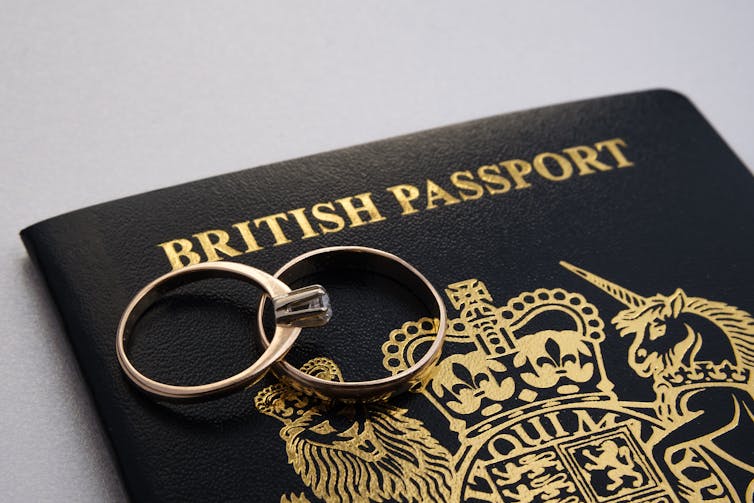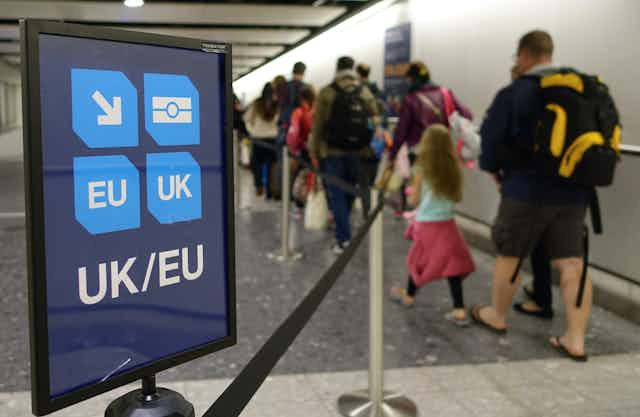The government has announced a host of new restrictions aimed at cutting net migration to the UK. Headline announcements include increasing the salary requirements for skilled foreign workers from £26,200 to £38,700, and banning health and care workers from bringing family dependants to the UK.
In the fine print is a doubling of the minimum income requirement (MIR) for family visas to £38,700. This means that many British citizens will be unable to bring their non-British spouse or partner to the UK. If implemented, it will cause the separation of thousands of couples and of children and parents.
The UK already has the second-most restrictive family immigration regime in Europe, if not the world. The MIR was first introduced to the UK immigration rules in 2012 at £18,600 per annum. At that time, this was above the income of 47% of the UK adult population overall, and an even higher proportion of women, young people, some ethnic groups and those outside south-east England.
Its impact on families was devastating. By 2015, an estimated 15,000 children had been affected because the family couldn’t meet the requirements for reunification in Britain. Foreign parents remained stuck overseas (with or without their children), and many thousands of children were separated from them.
Although average wages have since increased, problems remain. The requirement is a minimum, with higher sums needed if the application includes children. Applicants must show that they have earned this salary for at least six months, meaning that if someone only recently met the threshold (through a new job or promotion) they would still have to wait months until their family could join them.
There is an alternative route to meet the financial requirements through cash savings, but it is prohibitively high at £62,500.
As recently as February 2023, a House of Lords inquiry criticised the family migration system as “at odds with the Government’s commitment to family life”. The inquiry recommended making the income requirement more flexible and advised against any increase.
Who will this affect?
The median salary for UK full-time employees is £34,963, so well over half will not meet the new threshold. Those aged 22-29, an age when many relationships are formed, earn even less – £30,328 for men and £27,937 for women.
Some key occupations earn much less. The care worker and home care median wage is £23,409. While migrant care workers will be exempt from the new salary threshold, care workers who are British citizens (or long term residents) will be unable to apply for family members to join them in the UK.
The government says the new requirement will ensure people bringing dependants to the UK can support them financially. But, unlike in 2012, the Migration Advisory Committee (a body of experts set up by the government to advise on immigration matters) has not been asked to evidence this claim.

The argument makes little sense to people unable to work full time because of childcare or other responsibilities, forced to live alone or as single parents, without their partner to share financial and childcare responsibilities.
We have conducted extensive research with families and couples kept apart by the UK immigration system. One of our participants, Sophia, and her husband had been living overseas but agreed that they would relocate to Britain because of political instability in his country. However, due to the minimum income requirement, she had to come alone with their daughter.
Sophia found herself torn between the needs of her child, deeply distressed by separation from her father, and working long hours to meet the threshold. With the new MIR, their separation would very likely have been permanent.
The increase in the threshold is staggering, and will be crushing for those hoping to reunite their families. Imagine having finally secured the childcare and job you need to bring your partner over, only to find the goalposts moved not just marginally, but beyond most people’s earning capacity.
Keeping families apart
Mixed nationality relationships are common in “global” Britain – in the year to September 2023, 65,278 people obtained a visa to join a British partner. One in 25 married or cohabiting couples in Britain have one UK-born and one EU-born partner.
UK-EU couples now fall under the immigration system, and will be among the many people affected by the new requirements. Our Brexit Couples project is researching the experience of these couples, uncovering their distress, delay, expense and frustration with the UK immigration system. As one of our respondents noted: “It feels like some sort of financial injustice, just the rich can do it, basically.”
The new threshold will be devastating for any British citizen who falls in love with a foreign partner. It is difficult to assess how many people will be affected.
Many will never apply (particularly after recent fee increases) and either move abroad or endure indefinite separation. Those who can afford to will appeal refusals on human rights grounds. They may well succeed, but only with more expense and even longer separation from their families.
The political consequences also cannot be predicted. Many more people will become aware of the draconian family migration rules when they or someone they care about is affected. The proposal may well turn out to be less popular than the government hopes.

